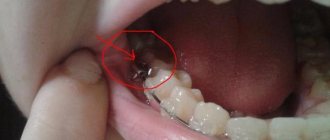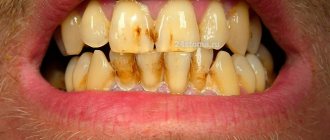Author of the article:
Soldatova Lyudmila Nikolaevna
Candidate of Medical Sciences, Professor of the Department of Clinical Dentistry of the St. Petersburg Medical and Social Institute, Chief Physician of the Alfa-Dent Dental Clinic, St. Petersburg
Dentists are often approached with such a problem as pain in the front teeth. There is nothing surprising. After all, although all our teeth have more or less the same internal structure, it is the incisors, due to their location, that are often subject to mechanical injuries.
In addition, our front teeth are distinguished by a thin layer of dentin (the bone tissue that makes up the bulk of the tooth). Because of this, caries on the incisors develops much faster than on other teeth.
Why do my front teeth hurt?
Front teeth can hurt for many reasons. Among them:
- Dental diseases, such as caries.
- Injuries to teeth and gums.
- Increased sensitivity of teeth.
- Incorrect treatment.
- Enamel wear.
- Inflammation of the facial nerve, which quite often occurs under stress.
- Inflammation of the gums, such as periodontitis.
In any case, only a qualified dentist can determine the cause of gum pain, so it is very important to see a doctor if you experience the slightest pain.
And in this article we will look in detail at the causes of pain.
Caries on front teeth
Carious formations do not appear overnight; it is always a gradual process due to the fact that pathogenic bacteria multiply in dental plaque and weaken the enamel. The destruction of the enamel gives microbes a “pass” into the tooth, where the pathological process grows, affecting healthy tissue.
Pain in the front teeth occurs at a late stage of caries, when the pulp is affected, including the nerve process that is part of it. That is, this symptom is no longer a reason to go to the dentist, but a persistent warning - it will only get worse.
It should be noted that carious formations are largely associated with insufficient oral hygiene. Other, less important factors include:
- lack of minerals in the diet;
- lack of solid food;
- heredity;
- systemic diseases that disrupt metabolism;
- dental injuries and others.
It is very important to brush your teeth correctly using suitable products. ASEPTA offers the best toothpastes for the whole family. They gently cleanse, saturating the enamel with minerals. A series of products for adults is designed specifically taking into account the needs of people. Thus, “ASEPTA PLUS” COFFEE AND TOBACCO eliminates the consequences of drinking strongly colored drinks and smoking cigarettes, and also whitens the enamel.
Trauma to a tooth or gum
If the enamel of a front tooth or gum is injured, pain may be felt. Upon examination, you may see cracks in the enamel, darkening or redness, and slight swelling of the soft tissue.
Tooth injuries are dangerous due to the development of caries, since cracks allow pathogenic bacteria to enter. You should definitely contact your dentist if you feel pain in your front teeth.
Increased tooth sensitivity
An intense tooth reaction to cold/hot or sweet foods is a sign of thinning enamel. The reasons for this can be different - from a lack of minerals in the body to metabolic diseases.
Increased sensitivity of enamel is a reason to schedule a visit to the doctor. He will determine the cause of this symptom and prescribe adequate treatment.
To reduce painful manifestations, use ASEPTA SENSITIVE paste, which will saturate the enamel with the missing mineral components.
Consequences of dental treatment
If you have recently had dental treatment and your tooth still hurts, you should think about the possible causes. So, on the first day after the intervention, pain in the front teeth is normal. It can be felt as an unpleasant weak sensation (you “feel the tooth”) or as a low-intensity aching pain. However, if it is excessive and difficult to bear, consult your doctor.
If painful symptoms continue for 3-4 days and the pain does not subside, this is a reason to visit the dentist again. Perhaps the treatment was carried out incorrectly or complications occurred.
Enamel wear
This phenomenon is uncommon, usually accompanies systematic violations of hygiene rules, some chronic diseases, or is associated with heredity. If you feel that your front teeth - lower or upper - are hurting, but you don’t notice any defects on them, this is also a reason to consult a dentist. If the discomfort is associated with abrasion of the enamel, the doctor will prescribe remineralizing procedures and also help adjust the diet. Thus, if there is a lack of minerals, it is recommended to use special vitamin and mineral complexes, for example, ASEPTA.
Inflammation of the facial nerve
Hypothermia, stress, decreased immunity due to illness - all this can lead to an inflammatory process in the facial nerve, which can be felt as pain in the front teeth and jaw. The feeling is very unpleasant. The pain is quite strong, acute, dulled only by a strong analgesic.
Be sure to consult a therapist with this problem. Try not to get too cold, drink more fluids, as it helps remove waste products.
Gum diseases
Problems with the gums can manifest themselves as pain in the front teeth; treatment in this case is aimed specifically at solving problems with soft tissues. The reasons for them are varied - from injury to non-compliance with hygiene standards. Only a doctor will determine what factors provoked the disease.
A visual examination of the gums may show tenderness, redness, and swelling. This is a reason to visit a doctor in the next 1-2 days.
Toothache as a sign of a heart attack
A heart attack is a cardiovascular pathology. It is also one of the clinical forms of ischemic disease. The mortality rate for heart attack is more than 60%.
Intact toothache on the left side of the jaw is considered one of the precursors of vascular pathology. It occurs 12-24 hours before an attack. Along with dentalgia, patients complain of headache, shortness of breath, nonproductive cough and changes in the normal heart rhythm.
The main symptom of a heart attack is considered to be angular pain. It appears 10-20 hours after the first manifestations. The duration of the attack itself varies from several minutes to an hour. To stop it, you need to take a Nitroglycerin tablet.
What can cause pain on the front teeth?
First of all, the fact that the front lower or upper teeth hurt, of course, is due to incorrect or insufficient oral hygiene. You can also identify such provoking factors as:
- constant mechanical impact, for example, due to a love of nuts or seeds;
- non-compliance with the dentist’s recommendations after treatment;
- bruxism (grinding teeth in sleep);
- untreated teeth in the mouth;
- hereditary predisposition;
- poor nutrition;
- occupational hazards (boxers, trumpet players, etc.);
- using forks, toothpicks, needles to clean interdental spaces;
- malocclusion.
It is important not to forget that the gap between the front teeth is often so narrow that it is impossible to get any leftover food out of it. This is why flossing your front teeth is important. It is also very important to visit the dentist on time, since carious stains are often located on the inner surface of the tooth, and only a doctor can see them.
If your front teeth hurt, most likely this means that pulpitis has begun to develop due to advanced caries.
First, the tooth begins to respond acutely to temperature fluctuations (hot drinks, cold weather, etc.), then it begins to bother you when biting food. At a later stage, sharp pain in the front teeth can occur at any time, even during sleep.
In this case, you need to contact your dentist, and the sooner the better. Only he can cure this disease and restore health and beauty to your smile.
Dentin reaction
Dentin is the hard tissue of the tooth underneath the enamel. This is a layer that, after damage, can allow irritants to pass into the nerve zones. Dentin is destroyed during advanced stages of caries, and can also occur with inadequate dental treatment if an infection develops under a filling.
If teeth ache for this reason, the patient feels a drilling, sharp pain, similar to the sensations of purulent pulpitis.
In very rare cases, teeth ache due to the patient’s individual intolerance to certain dental medications, after visiting a doctor. In this case, the pain is accompanied by itching in the gums and palate.
Treatment of anterior teeth
Many people are interested in whether the front teeth are treated. Of course they do. True, the accuracy, precision, experience and qualifications of the doctor are important in this case, because the front teeth are very thin and can be easily damaged.
An experienced doctor will do everything possible to keep the tooth intact and at the same time remove carious lesions. Quite often, the front teeth suffer from pulpitis.
How are anterior teeth with pulpitis treated? To do this, the doctor uses local anesthesia, and after the medicine takes effect, the dentist removes the affected nerve, then carefully cleans the canals and seals them. And only after that he directly begins to restore the tooth.
And to make sure that the treatment was carried out correctly, the doctor may additionally order an image to be taken after the filling.
If you feel that your front tooth hurts after treatment, immediately visit the dentist and tell us about this problem.
For your part, try to prevent the occurrence of caries and pulpitis. Maintain diligent oral hygiene, in addition to regularly brushing your teeth morning and evening, using dental floss and disinfectant rinses. We recommend using products from the ASEPTA line, which are developed and produced by the pharmaceutical industry.
It is also necessary to monitor your diet, eating fresh fruits and vegetables, fish, dairy products and limiting sweets and starchy foods.
Do children have pulpitis?
And our expert answers this question in the affirmative, since baby teeth also have nerves that can become inflamed and cause pain. Treatment methods vary and depend on the form of the disease. Pulpitis may be reversible or irreversible, depending on whether it communicates with the pulp cavity. Today, treatment using various calcium-based drugs has been quite developed, which have proven themselves, especially in the treatment of reversible pulpitis. There are compounds that remove the nerve, but no one has canceled the classic method for irreversible pulpitis - extirpation of the pulp with further filling of the root canals. If the defect is not too noticeable, filling materials are used for restoration. If the tooth is severely damaged, then doctors install metal crowns so that it can stand its normal life until the change and does not collapse.
Clinical researches
During clinical trials using a series of Asepta products, conducted in the department of periodontology of the Central Research Institute of Dentistry and Maxillofacial Surgery of Rosmedtekhnologii, Moscow, the high effectiveness of Asepta products for moderate periodontitis was proven. The use of Asepta mouth rinse turned out to be quite effective. In addition, no phenomena of mucosal irritation or brown staining of fillings were recorded. This indicates that the use of this rinse for a two-week period provides an obvious clinical effect in the absence of negative side effects.
Sources:
- Report on determining/confirming the preventive properties of commercially produced personal oral hygiene products: Asepta toothpaste used in combination with Asepta mouthwash and Asepta gum balm Head. Department of PFS Doctor of Medical Sciences Professor S.B. Ulitovsky St. Petersburg State Medical University named after Academician I.P. Pavlova. Faculty of Dentistry. Department of Preventive Dentistry.
- Clinical experience in using the Asepta series of products Fuchs Elena Ivanovna Assistant of the Department of Therapeutic and Pediatric Dentistry State Budgetary Educational Institution of Higher Professional Education Ryazan State Medical University named after Academician I.P. Pavlova of the Ministry of Health and Social Development of the Russian Federation (GBOU VPO RyazSMU Ministry of Health and Social Development of Russia)
- Clinical and laboratory assessment of the influence of domestic therapeutic and prophylactic toothpaste based on plant extracts on the condition of the oral cavity in patients with simple marginal gingivitis. Doctor of Medical Sciences, Professor Elovikova T.M.1, Candidate of Chemical Sciences, Associate Professor Ermishina E.Yu. 2, Doctor of Technical Sciences Associate Professor Belokonova N.A. 2 Department of Therapeutic Dentistry USMU1, Department of General Chemistry USMU2
What is absolutely forbidden to do?
In order not to double the painful sensations of aching in the jaw, it is important to adhere to several rules before visiting a doctor:
- Regularly clean the oral cavity of food debris; sometimes it is particles from lunches and dinners that often become the cause of especially severe pain in pulpitis and periodontitis.
- Never chew on the side of the affected tooth.
- Heating a sore spot is strictly prohibited. Any hot compresses increase blood flow and increase pain.
- Try not to be in a lying position; this position activates blood circulation in the periodontal tissues and increases pressure on them.
We have listed the main ways to relieve toothache. However, these methods, with all their diversity, will not help cure the cause of the unpleasant manifestation and are only a temporary measure. As soon as you feel your teeth hurting, make an appointment with the dentist. Believe me, the sooner you start treatment, the faster and cheaper you will get rid of painful sensations.
List of neurotic dental diseases
Stressful periods have a particularly detrimental effect on the state of the body. In addition, as practice shows, the quality of oral hygiene deteriorates sharply. A person simply forgets about cleaning or does not do it thoroughly enough, which increases the risk of developing caries. The parallel use of sedative medications disrupts the production of saliva and causes a feeling of dryness.
Gradually, all this is reflected in psychosomatics - muscle spasms and pain are detected. The most common occurrence is excessive clenching of the jaw.
Bruxism
A disorder characterized by uncontrollable grinding of teeth caused by emotional stress. As a rule, it makes itself felt during sleep. The causes of its appearance include stress, prolonged depression, and malfunctions of the masticatory apparatus.
Grinding
This is not so much a full-fledged disorder as a symptom. Occurs when muscle spasms occur when the patient clenches his jaw tightly. In the vast majority of cases, the person does not even know there is a problem. It is detected during routine dental examinations.
Diseases associated with enamel
What are the possible dental problems due to enamel damage? In the vast majority of cases, they are associated with violations of the structure and integrity of the rows. Usually they are a consequence of internal failures in the body. They are eliminated only at the moment when the factor that provoked their exacerbation disappears.
Fluorosis
A chronic disease that develops during eruption. Accompanied by structural damage, darkening, and loss of dentin. The reason is excess fluoride, which is explained by long-term use of fluoridated water, medications, etc.
Cracks
Deviation, usually localized on the anterior chewing row. It looks like vertically or horizontally located defects of a non-carious nature. Appears due to sudden temperature changes, aggressive chemical exposure, or due to injury.
Turner teeth
An advanced form of local manifestations of hypoplasia. It is fixed long before the first eruptions and has nothing to do with carious lesions. Externally it looks like an enamel layer. Sometimes accompanied by excessive sensitivity.
Hypoplasia
Pathological phenomena of a congenital nature, which is characterized by a complete or partial absence of enamel. If we talk about the external picture, then it is worth noting depigmented or white spots, rather large grooves based on the surface, as well as small depressions. Caused by incorrect structure of hard dental tissues. If left untreated, it is complemented by acute forms of caries.
Wedge-shaped defect
Disadvantages expressed in wedge-shaped cavities in the cervical region of the units. This occurs due to the fact that certain areas of the enamel disappear, resulting in wedge holes. The problem can be registered on any element, but more often on fours and fives.
Let's sum it up
Dentistry studies the etiology, symptoms, and treatment features of the most common dental diseases. There are a huge number of reasons that provoke oral problems. Some of them are easily eliminated, others are subject to only partial correction. However, for both cases the rule is true: the sooner you start working on dental treatment, the higher the likelihood of a favorable outcome. That is why it is important not to let things take their course and undergo regular medical examinations.
Basic terms in dentistry: names and causes of inflammatory diseases of the teeth and oral cavity
It plays a vital function in the digestion process: it is responsible for grinding food and influencing its subsequent breakdown by enzymes. In addition, there is a huge number of microorganisms that create natural microflora, but are considered opportunistic. This nuance determines the fact that any dental disorders progress extremely quickly.
Among the key factors in the occurrence of dental diseases are:
- poor hygiene;
- mechanical injuries and damage;
- chronic illnesses;
- metabolic disorders and abnormalities;
- the presence of thermal irritants in the body;
- bad environment;
- hereditary predisposition.
The branch of medicine that studies the emergence and development of pathologies is called etiology. It is partially correlated with diagnostic procedures, as it helps in determining pathogenesis.
The main dental diseases in humans: what they are and how to treat them
Modern medical practice, implemented in the Dentika dental clinic, actively uses innovative methods of diagnosis and treatment. Almost any disease can be eliminated provided that you seek help in a timely manner, as well as follow all doctor’s prescriptions and prescriptions. Among the measures used by dentists are:
- filling;
- surgical intervention;
- prosthetics;
- implantation;
- aesthetic correction.
In addition, professional hygiene methods are used: bleaching, restoration, etc.
Prevention
Above, we examined in detail what dental diseases are called and what are the main reasons for their occurrence. Now let's talk about preventive measures to avoid serious problems and pathologies.
If you experience any strange sensations in your mouth, it is recommended that you make an appointment with your dentist immediately. He will conduct an initial examination and draw up an individual treatment program. However, in some cases it is possible not to resort to aggressive measures of influence and limit oneself to supportive manipulations.
So, what needs to be done to prevent the development of diseases?
- Do not ignore the symptoms that appear - go to the doctor immediately.
- Do not let the disease worsen, follow all dental recommendations and prescriptions.
- Get professional examinations every six months.
- Maintain hygiene at home, use only high-quality products.
- Don’t forget about professional hygiene - ultrasonic cleaning should be done once every six months to a year.
In addition, it is important to adhere to the principles of proper nutrition and give up bad habits.










